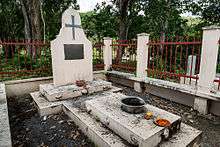Gunsanad Kina
| Datuk Seri Panglima O.K.K Gunsanad Kina | |
|---|---|
 The grave of Gunsanad Kina in Keningau District | |
| Born |
1840 Bandukan, Keningau, Bruneian Empire |
| Died | 1 January 1930 |
| Occupation | Chief |
Datuk Seri Panglima O.K.K Gunsanad Kina (1840-1 January 1930) was a chief of the Dusun and Murut peoples. In association with Sampuun of Tambunan, he was one of the key figures involved in getting the British North Borneo Company to actively govern the interior region of the then North Borneo (later Sabah).
Biography
Kina was born in 1840 in Bandukan, Keningau. He was the eldest son in his family and was also known as Botut among relatives. He grew up doing farming and small businesses. His life changed when he obtained a shiny stone known as the Kumala. The event occurred when he followed his father to Kimanis and Bongawan to sell their farm goods, which were mainly cotton. In order to travel to the main trading center at that time, people would have to walk on foot across the Crocker range for days through hills and mountains. After a day's journey, they rested on an area close to the river. They eventually camped for the night. During the night, Agiu, one of the group members and Kina went to fish at the river. That night, he had a dream about obtaining the Kumala at the same spot where he had caught a fish. He went to the river and found the mystic stone.
When Kina reached adulthood, he became more involved in the cotton business and ended up selling at the same place where he used to trade with his father and friends. His business soon expanded and involved more goods such as rubber and clothes until he eventually was able to open a shop in Papar. Having limited knowledge in business, he first attempt failed but it doesn't stop him from trying again. He opened two more shops in Keningau and Sapulut, but he went bankrupt again.
He finally decided to return to his former business and spend most of his time with his family in Bandukan, Keningau.
In 1915, Kina was given the title OKK (Orang Kaya-Kaya) for his leadership in doing his job with the BCC (British Chartered Company). He was appointed to lead a negotiation in Rundum to promote peace among the locals and the company. Tribe clashes in Rundum were common in those days and many people were killed in the war. The war started when the BBC began imposing high and unnecessary taxes to the people especially the poor ones.
Kina and his nephew Musad tried to reach an agreement with the locals, but only half of the people were willing to pay the taxes. During the visit, one of the villagers befriended Musad and offered to bring him and his group to a good hunting ground in the area. Musad accepted the offer. However, they were ambushed in the jungle by a group called Alison and Musad was badly injured while the others have either fled or died. Musad was able to escape with his life, but died before reaching Kina.
The story finally reached the BCC and they decided to take stern action against the people. Kina and his troops were given guns and ammunition and this led to the Rundum war. Many were killed in action, but a few survived by hiding in caves. This did not stop the troops from hunting them down. Knowing that the villagers used the river as a food and water source, they poisoned the river, killing even more people
Those that did survive, were also killed and decapitated as proof of their victory to the British. The skulls were said to be kept by one of Kina's children and were also said to be used in certain ceremony.
Kina played a role in the war against Mat Salleh in Tambunan in 1874 to 1900, but the whole story was never documented.